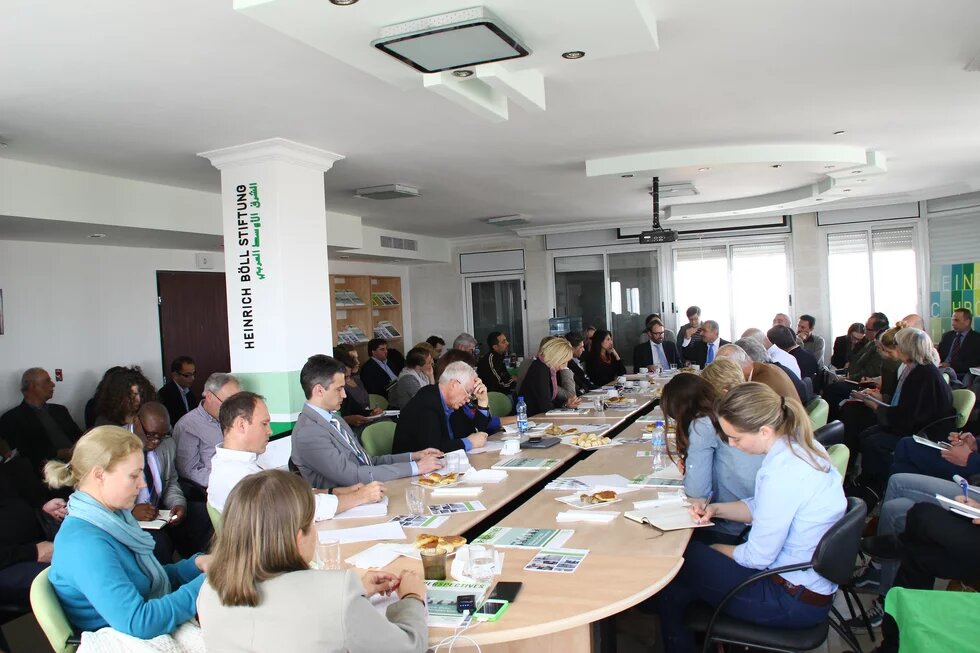
While the negotiations about the framework agreement facilitated by US Secretary of State John Kerry are still ongoing, Palestinians are debating their political options beyond the talks which many regard as futile. The Heinrich Böll Foundation organized a round table debate entitled “The Kerry Framework – (Any)where to go from here?” aiming to discuss this issue with Dr. Mohammad Shtayyeh, former negotiator and senior advisor to president Mahmoud Abbas, political analyst, legal advisor, and former PLO spokesperson Diana Buttu, as well as the director of the human rights organization Al Haq, Dr. Shawan Jabarin. While details of the “Kerry Framework” are not yet known, several reports alleged that John Kerry suggested the establishment of the Palestinian capital in the Jerusalem neighborhood of Beit Hanina (instead of East Jerusalem as a whole), the incorporation of major settlement blocs into Israel as part of a territorial exchange, and a long-term Israeli military presence in the Jordan Valley; Israel demands the recognition as a “Jewish state” from the Palestinian leadership.
In his introduction, Mohammad Shtayyeh clarified some key points of the Palestinian negotiating position which he assessed as extremely difficult: according to him, the Israeli government was not ready to accept anything less than Jerusalem as the undivided “eternal Jewish capital” while according to International Law East Jerusalem is occupied and its annexation by Israel has not been recognized internationally. Shtayyeh said in the framework of a negotiated solution Palestinian refugees need to have the individual right to chose to either stay at the country they are living in now, go to a third country, come to the Palestinian state, or return to their original home. With regards to the Jordan Valley and the related security considerations, the Palestinian negotiators suggested a four year interim period with international security forces overseeing an Israeli withdrawal.
As the controversy about the recognition of Israel as a “Jewish state” is getting bigger, Shtayyeh confirmed that the Palestinian Authority will under no circumstances accept this term. The PLO already recognized Israel at the beginning of the Oslo process, and as neither Egypt nor Jordan were asked to recognize Israel as a “Jewish state” in their respective peace treaties, he stated this should be sufficient. As Hussien Ibish stated in a recent op-ed in Haaretz: “The single most significant impact of this "Jewish state" demand is that it effectively dismisses and reverses the 1993 Palestinian recognition of Israel.” Shtayyeh believes that Israel uses the issue to settle the historical account with the Palestinians without making any concessions: While Jews from around the world will be able to immigrate to Israel, Palestinians are being denied return to their home country. At the same time, the term also raises questions about the status of Palestinian citizens of Israel who already face discrimination in many sectors. Acceptance of the term would facilitate the imposition of a Jewish narrative of Palestine, while ignoring the Christian and Islamic narratives and history.
Shtayyeh asked to keep three important dates in mind: The visit of Abbas to Washington on 17th March in order to present the Palestinian position towards Kerry’s framework suggestions; 29th March as the date for the release of the last tranche of Palestinian pre-Oslo prisoners; and 29th April since this is the final deadline for the current period of negotiations and will raise the question of an extension. Shtayyeh underlined that he does not expect the Palestinian Authority to agree to an extension of the talks beyond that date since in his view there is no serious intention to reach an agreement from the Israeli side. According to him, Israel wants “two states with three systems” – the states being Israel and Palestine, but with two isolated Palestinian areas in the West Bank and in Gaza who do not equal an independent state.
Diana Buttu pointed out that the negotiation process is determined by asymmetry. Since the first day of the negotiations, many crucial issues have not even been addressed while Israel continued settlement expansion. The needs and positions of Palestinians inside of Israel are continuously being disregarded; the issue of water has been ignored. Buttu said the Israeli position – demanding the recognition as a Jewish state – is racist and discriminatory in its core, as long as Jewish people from around the world can immigrate to Israel while none of the Palestinian refugees is allowed to return. The Palestinian Authority, in Buttu’s view, should adopt a demand of full decolonization of the occupied Palestinian territory (i.e. complete dismantling of settlements without landswaps), include the situation in Gaza in the negotiations, as well as the issue of the refugees.
Like the two speakers before him, Shawan Jabarin expressed his skepticism regarding Israel’s political will to reach a settlement, both taking into account the negotiations and the daily human rights violations in the West Bank and Gaza Strip. He raised opposition to the idea of “land swaps” as they aim to legalize the principally illegal settlements. Compromising on absolute rights, as President Abbas has considered in the past, would be a dangerous path. While Jabarin mentioned a leadership crisis among Palestinians, he considers this the perfect moment to use the status of Palestine at the UN and take the settlement issue and the Israeli violations to the international forums and courts or to seek the jurisdiction of the International Criminal Court (ICC). In response, Mohammad Shtayyeh confirmed that there is a “Plan B” in case the current round of negotiations ends without results, which includes a move towards UN agencies and a legal route, but the PA was waiting for the right time and currently preparing their strategy.

















